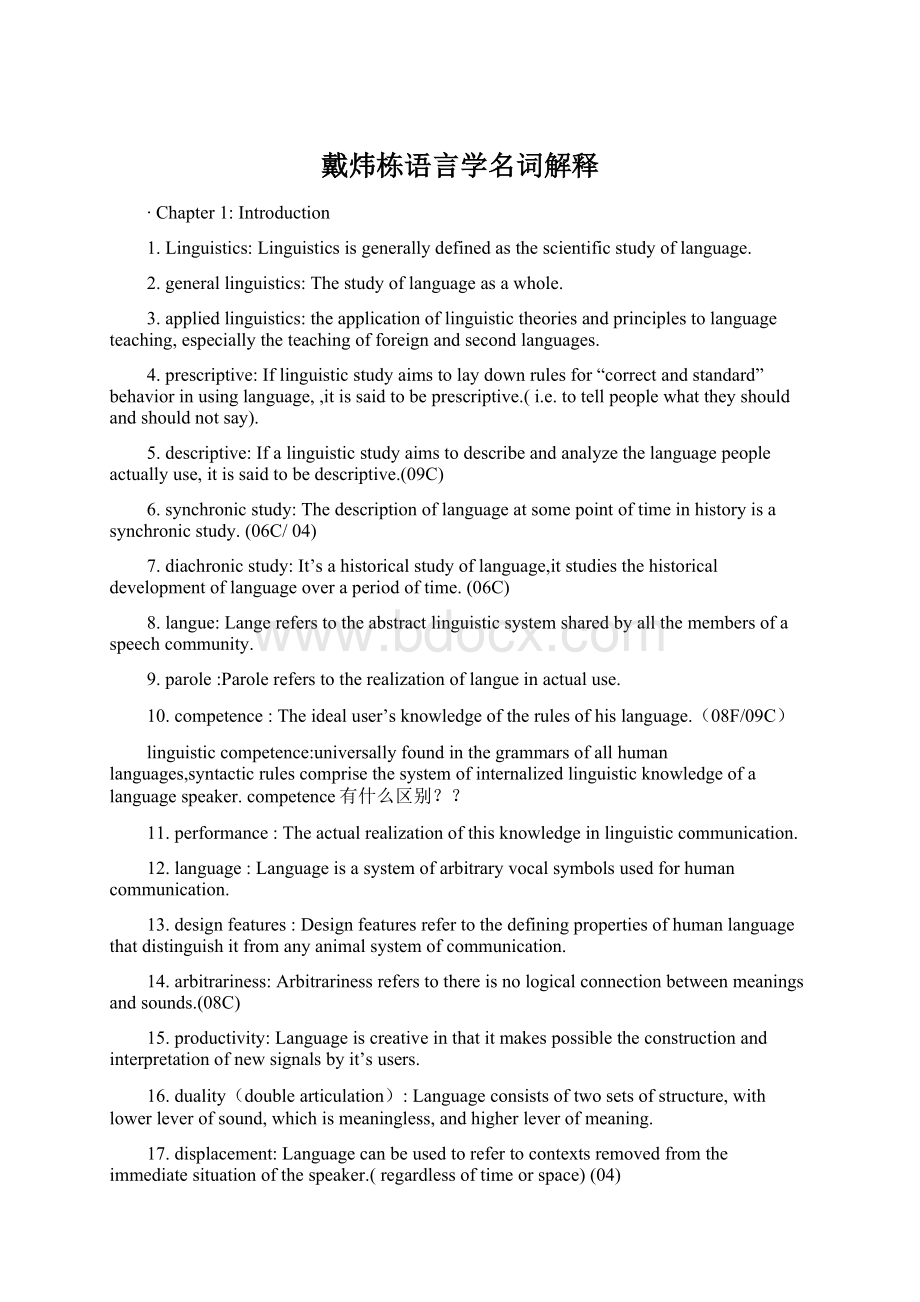戴炜栋语言学名词解释.docx
《戴炜栋语言学名词解释.docx》由会员分享,可在线阅读,更多相关《戴炜栋语言学名词解释.docx(23页珍藏版)》请在冰豆网上搜索。

戴炜栋语言学名词解释
∙Chapter1:
Introduction
1.Linguistics:
Linguisticsisgenerallydefinedasthescientificstudyoflanguage.
2.generallinguistics:
Thestudyoflanguageasawhole.
3.appliedlinguistics:
theapplicationoflinguistictheoriesandprinciplestolanguageteaching,especiallytheteachingofforeignandsecondlanguages.
4.prescriptive:
Iflinguisticstudyaimstolaydownrulesfor“correctandstandard”behaviorinusinglanguage,,itissaidtobeprescriptive.(i.e.totellpeoplewhattheyshouldandshouldnotsay).
5.descriptive:
Ifalinguisticstudyaimstodescribeandanalyzethelanguagepeopleactuallyuse,itissaidtobedescriptive.(09C)
6.synchronicstudy:
Thedescriptionoflanguageatsomepointoftimeinhistoryisasynchronicstudy.(06C/04)
7.diachronicstudy:
It’sahistoricalstudyoflanguage,itstudiesthehistoricaldevelopmentoflanguageoveraperiodoftime.(06C)
8.langue:
Langereferstotheabstractlinguisticsystemsharedbyallthemembersofaspeechcommunity.
9.parole :
Parolereferstotherealizationoflangueinactualuse.
10.competence :
Theidealuser’sknowledgeoftherulesofhislanguage.(08F/09C)
linguisticcompetence:
universallyfoundinthegrammarsofallhumanlanguages,syntacticrulescomprisethesystemofinternalizedlinguisticknowledgeofalanguagespeaker.competence有什么区别?
?
11.performance :
Theactualrealizationofthisknowledgeinlinguisticcommunication.
12.language :
Languageisasystemofarbitraryvocalsymbolsusedforhumancommunication.
13.designfeatures :
Designfeaturesrefertothedefiningpropertiesofhumanlanguagethatdistinguishitfromanyanimalsystemofcommunication.
14.arbitrariness:
Arbitrarinessreferstothereisnologicalconnectionbetweenmeaningsandsounds.(08C)
15.productivity:
Languageiscreativeinthatitmakespossibletheconstructionandinterpretationofnewsignalsbyit’susers.
16.duality(doublearticulation):
Languageconsistsoftwosetsofstructure,withlowerleverofsound,whichismeaningless,andhigherleverofmeaning.
17.displacement:
Languagecanbeusedtorefertocontextsremovedfromtheimmediatesituationofthespeaker.(regardlessoftimeorspace)(04)
18.culturaltransmission:
Thecapacityforlanguageisgeneticallybasedwhilethedetailsofanylanguagesystemhavetobetaughtandlearned.(Languageisculturallytransmittedratherthanbyinstinct).
19.Sociolinguistics:
thestudyofallsocialaspectsoflanguageanditsrelationwithsocietyfromthecoreofthebranch.
20.Psycholinguistics:
thestudyoflanguageprocessing,comprehendingandproduction,aswellaslanguageacquisition.
municativecompetence:
theabilitytouselanguageappropriatelyinsocialsituations.
∙Chapter2:
Phonology
1.phonicmedium :
Thelimitedrangeofsoundswhicharemeaningfulinhumancommunicationconstitutethephoneticmediumoflanguage.(andtheindividualsoundswithinthisrangearespeechsounds)
2.phonetics :
Thestudyofphonicmediumoflanguageanditisconcernedwithallsoundsintheworld’slanguages.(06C)
3.articulatoryphonetics :
Itstudiessoundsfromthespeaker’spointofview,i.e.howaspeakeruseshisspeechorganstoarticulatethesounds.(03)
4.auditoryphonetics:
Thestudiessoundsfromthehearer’spointofview,i.e.howthesoundsareperceivedbythehearer.
5.acousticphonetics:
Itstudiesthephysicalpropertiesofthestreamofsoundswhichthespeakerissues.
或者Itstudiesthewaysoundstravelbylookingatthesoundwaves,thephysicalmeansbywhichsoundsaretransimittedthroughtheairfromonepersontoanother)
6.voicing:
thewaythatsoundsareproducedwiththevibrationofthevocalcords.
7.voiceless:
thewaythatsoundsareproducedwithnovibrationofthevocalcords.
8.broadtranscription:
Theuseoflettersymbolsonlytoshowthesoundsorsoundssequencesinwrittenform.
9.narrowtranscription:
Theuseoflettersymbol,togetherwiththediacriticstoshowsoundsinwrittenform.
10.diacritics:
Thesymbolsusedtoshowdetailedarticulatoryfeaturesofsounds.
11.IPA:
shortforInternationalPhoneticAlphabets,asystemofsymbolsconsistsoflettersanddiacritics,usedtorepresentthepronunciationofwordsinanylanguage.
12.aspiration:
Alittlepuffofairthatsometimesfollowsaspeechsound.
13.mannerofarticulation :
Themannerinwhichobstructioniscreated.
14.placeofarticulation :
Theplacewhereobstructioniscreated.
15.consonant:
aspeechsoundinwhichtheairstreamisobstructedinonewayoranother.
16.vowel :
aspeechsoundinwhichtheairstreamfromthelungmeetswithnoobstruction.
17.monophthong :
theindividualvowel.
18.diphthong :
Thevowelwhichconsistsoftwoindividualvowelsandareproducedbymovingonevowelpositiontoanotherthroughinterveningpositions.(08F)
19.phone:
Aphoneticunit,thespeechsoundswehearandproduceduringlinguisticcommunicationareallphones.
20.phoneme :
Anabstractphonologicalunitthatisofdistinctivevalue;it’srepresentedbyacertainphoneinacertainphoneticcontext.(06F/04)
或者Thesmallestunitofsoundinalanguagewhichcandistinguishtwosounds.
21.allophone :
thedifferentphoneswhichcanrepresentthesamephonemeindifferentphoneticenviromentsarecalledallophonesofthatphoneme(07C/05)
22.phonology :
Thedescriptionofsoundsystemsofparticularlanguagesandhowsoundsformpatternsandfunctiontodistinguishandconveymeaning.(06C)
23.phonemiccontrast :
twophoneticallysimilarsoundsoccurinthesameenvironmentanddistinguishmeaning,theyformphonemiccontrast.
24.complementarydistribution :
allophonesofthesamephonemeandtheydon’tdistinguishmeaningbutcomplementeachotherindistribution.
25.minimalpair:
twodifferentformsareidenticalineverywayexceptfor
onesoundsegmentwhichoccursinthesameposition.
26.sequentialrules:
Therulestogovernthecombinationofsoundsinaparticularlanguage.
27.assimilationrule:
Theruleassimilatesonesoundtoanotherbycopyingafeatureofasequentialphoneme,thusmakingthetwophonessimilar.
28.deletionrule:
Therulethatasoundistobedeletedalthoughitisorthographicallyrepresented.
29.suprasegmentalfeatures:
Thephonemicfeaturesthatoccurabovethelevelofthesegments(syllable,word,sentence),includingstresstoneintonation.(08F)
30.tone:
Tonesarepitchvariations,whicharecausedbythedifferingratesofvibrationofthevocalcords.
31.intonation:
Whenpitch,stressandsoundlengtharetiedtothesentenceratherthanthewordinisolation,they’recollectivelyknownasintonation.
32.nucleus:
Itreferstothemajorpitchchangeinanintonationunit.
32.minimalset:
soundcombinationswhichareidenticalinformexceptfortheinitialconsonanttogetherconstituteaminimalset.
∙Chapter3:
Morphology
1.morphology:
Abranchoflinguisticsthatstudiestheinternalstructureofwordsandrulesforwordformation.
2.openclass:
Agroupofwords,whichcontainsanunlimitednumberofitems,andnewwordscanbeaddedtoitconstantly.(08C)
3.closedclass:
Agroupofwordswhosemembershipissmallanddoesnotreadilyacceptnewmembers,includingconjunctions,prepositions,pronouns.etc.
4.morpheme:
Thesmallestunitofmeaningofalanguage.Itcannotbedividedwithoutalteringordestroyingitsmeaning.
5.affix:
aletteroragroupofletter,whichisaddedtoaword,andwhichchangesthemeaningorfunctionoftheword,includingprefix,infixandsuffix.
6.suffix:
Theaffix,whichisaddedtotheendofaword,andwhichusuallychangesthepartofspeechofaword.
7.prefix:
Theaffix,whichisaddedtothebeginningofaword,andwhichusuallychangesthemeaningofawordtoitsopposite.
8.boundmorpheme:
Morphemethatcannotbeusedalone,anditmustbecombinedwitothers.E.g.–ment.
9.freemorpheme:
amorphemethatcanstandaloneasaword.(07F)
10.derivationalmorpheme:
Boundmorpheme,whichcanbeaddedtoastemtoformanewword.
11.inflectionalmorpheme:
Akindofmorpheme,whichareusedtomakegrammaticalcategories,suchasnumber,tenseandcase.(butneverchangetheirsyntacticcategory).(08F)
12.morphologicalrules:
Thewayswordsareformed.Theserulesdeterminehowmorphemescombinetoformwords.
13.compoundwords:
Acombinationoftwoormorewords,whichfunctionsasasinglewords
14.inflection:
themorphologicalprocesswhichadjustswordsbygrammaticalmodificationtoindicatesuchgrammaticalcategoriesasnumuber,tenseorpluarity.(04)
15.Derivation:
Derivationisaprocessofwordformationbywhichderivativeaffixesareaddedtoanexistingformtocreateaword.
∙Chapter4:
Syntax
1.syntax:
Abranchoflinguisticsthatstudieshowwordsarecombinedtoformsentencesandtherulesthatgoverntheformationofsentences.
2.category:
Itreferstoagroupoflinguisticitemswhichfulfillthesameorsimilarfunctionsinaparticularlanguagesuchasasentence,anounphraseoraverb.
3.syntacticcategories:
Wordscanbegroupedtogetherintoarelativelysmallnumberofclasses,calledsyntacticcategories.
4.majorlexicalcategory:
onetypeofwordlevelcategories,whichoftenassumedtobetheheadsaroundwhichphrasesarebuilt,includingN,V,Adj,andPrep.
5.minorlexicalcategory:
onetypeofwordlevelcategories,whichhelpsormodifiesmajorlexicalcategory.
6.phrase:
syntacticunitsthatarebuiltaroundacertainwordcategoryarecalledphrase,thecategoryofwhichisdeterminedbythewordcategoryaroundwhichthephraseisbuilt.
7.phrasecategory:
thephrasethatisformedbycombiningwithwordsofdifferentcategories.(InEnglishsyntacticanalysis,fourphrasalcategoriesare